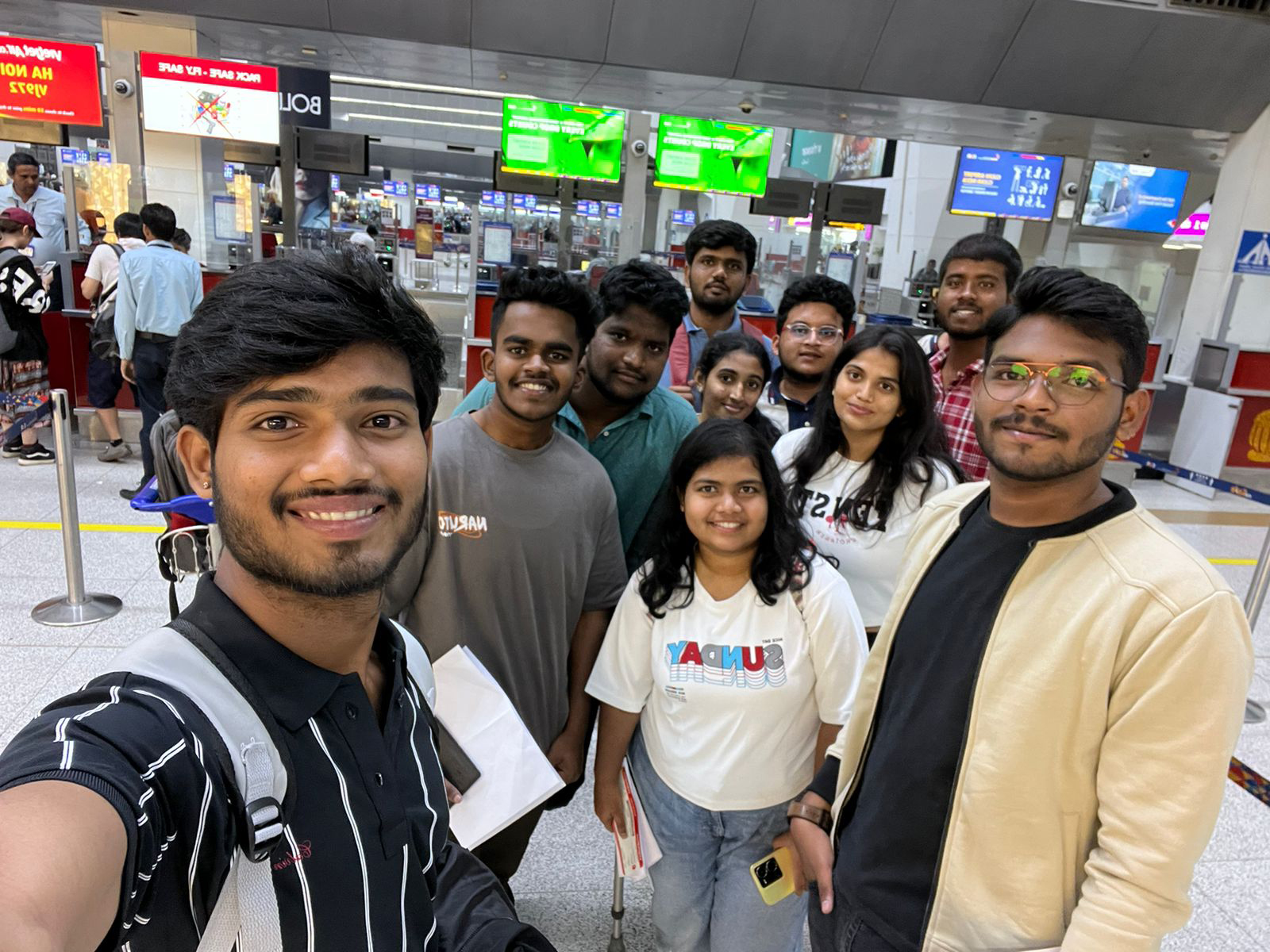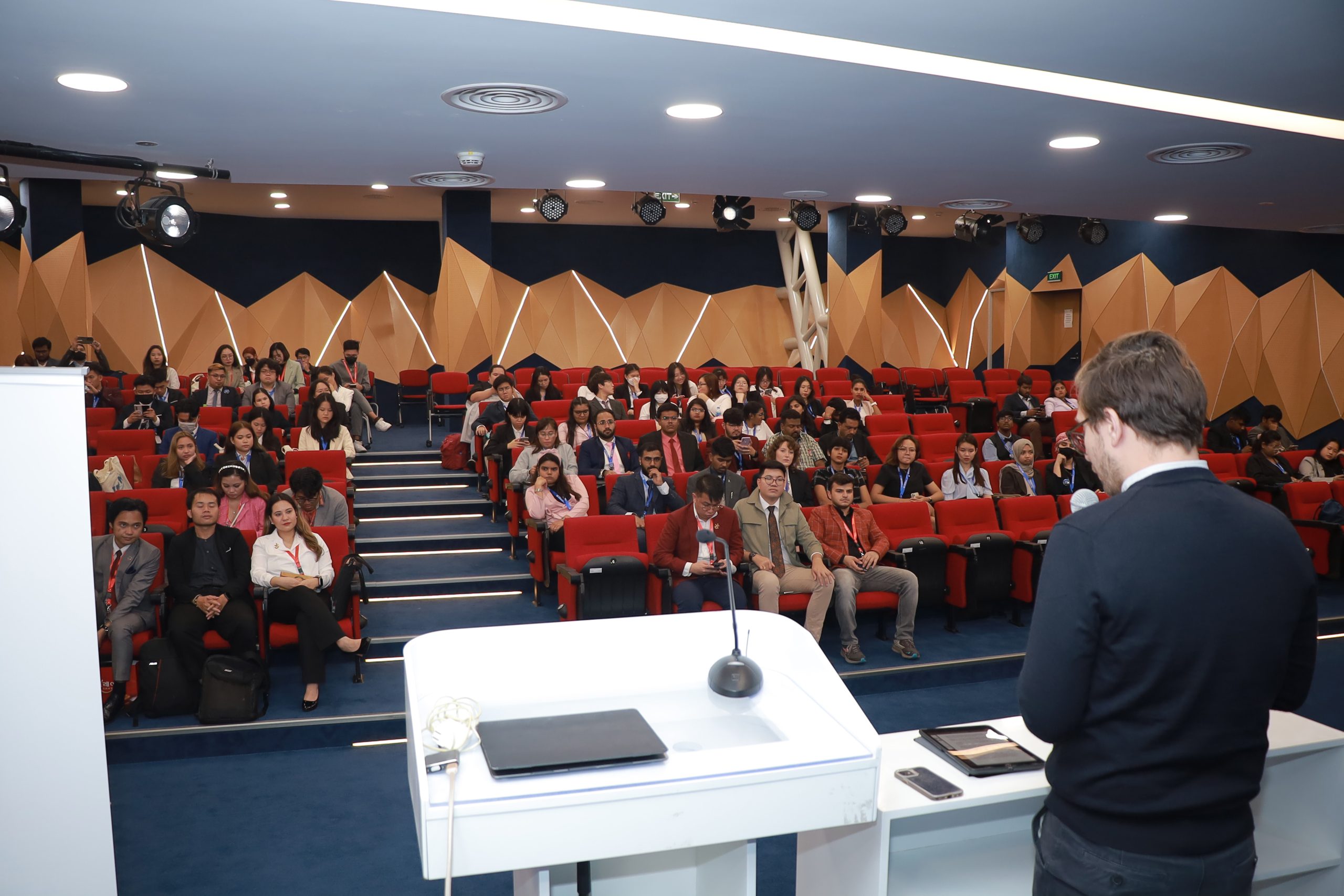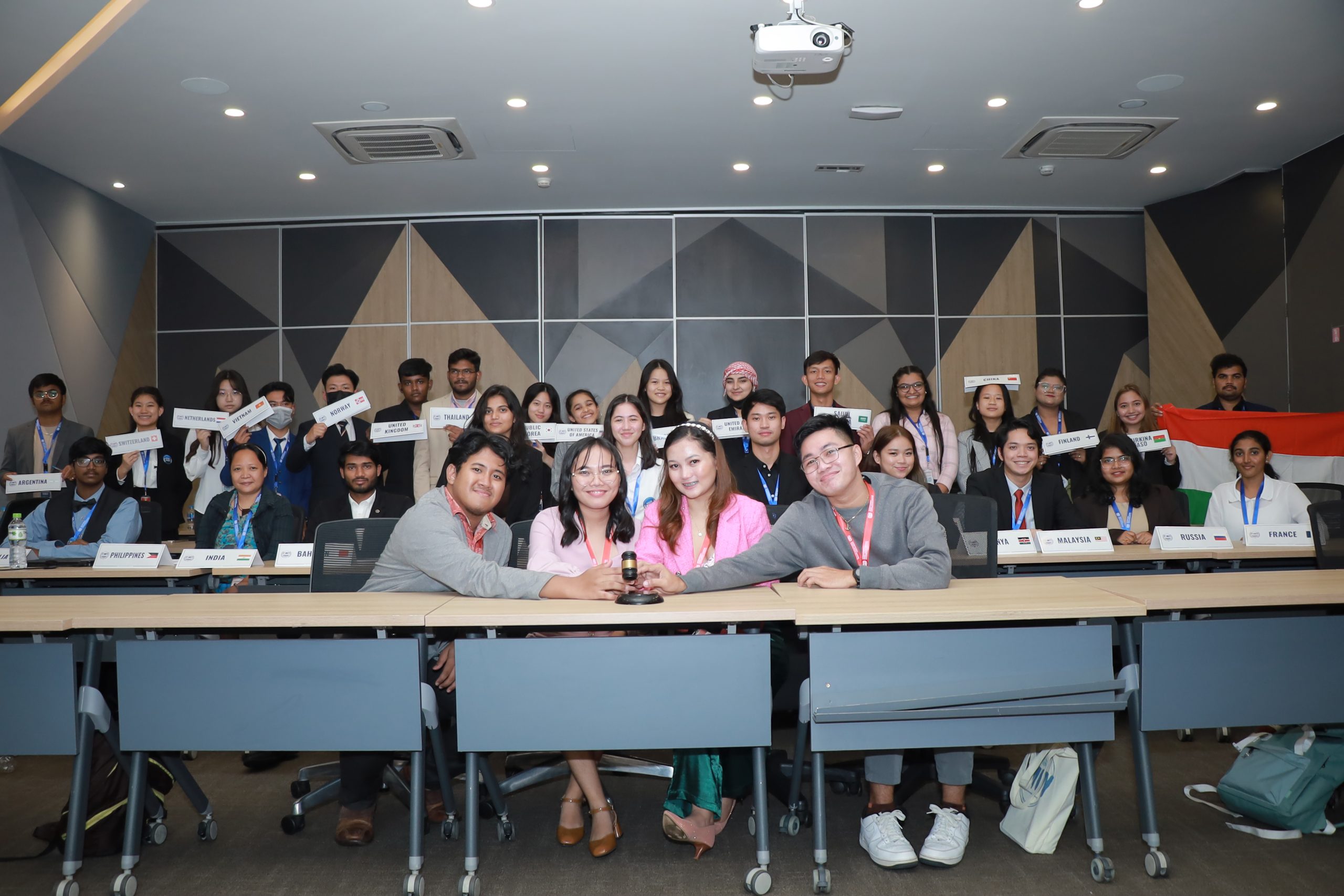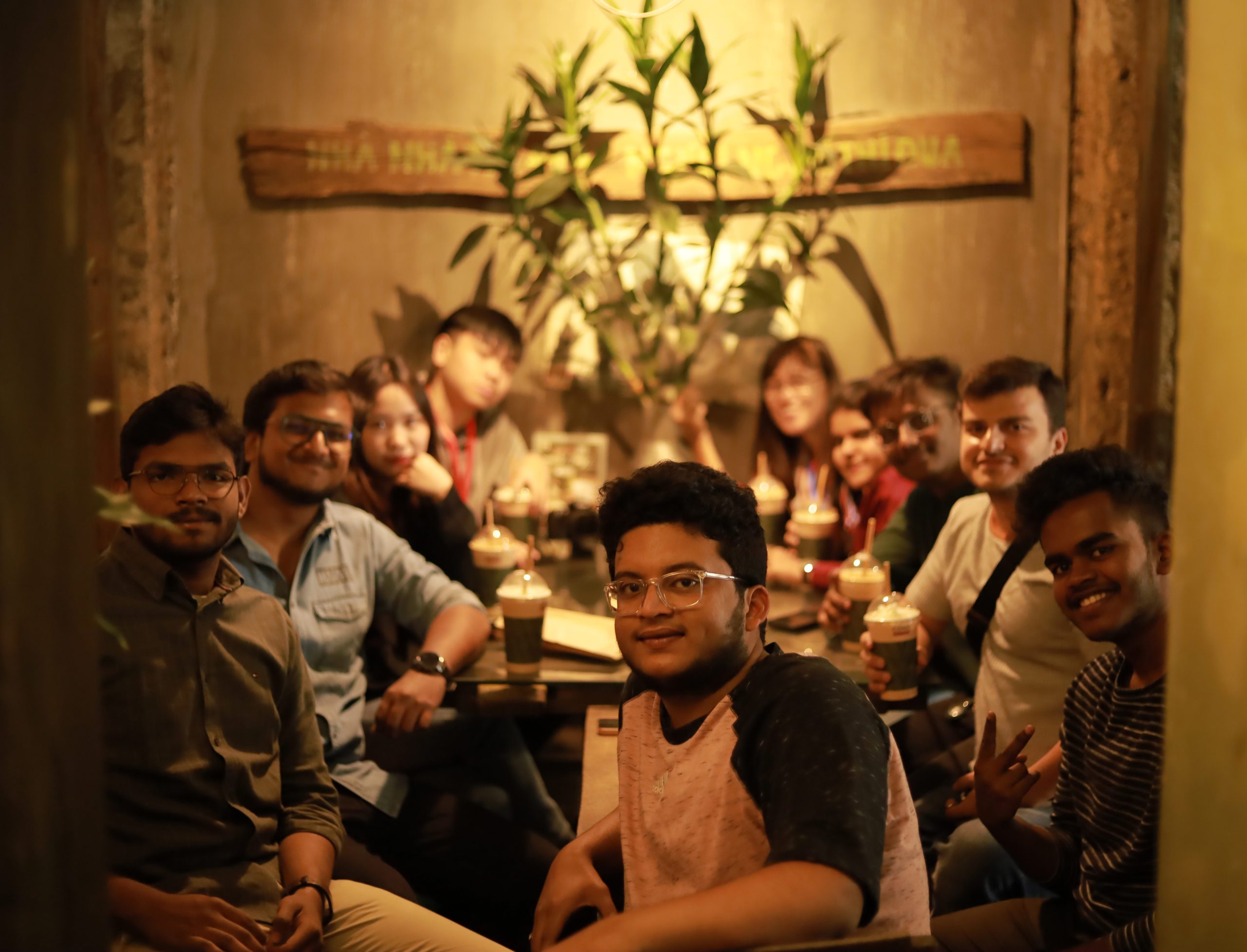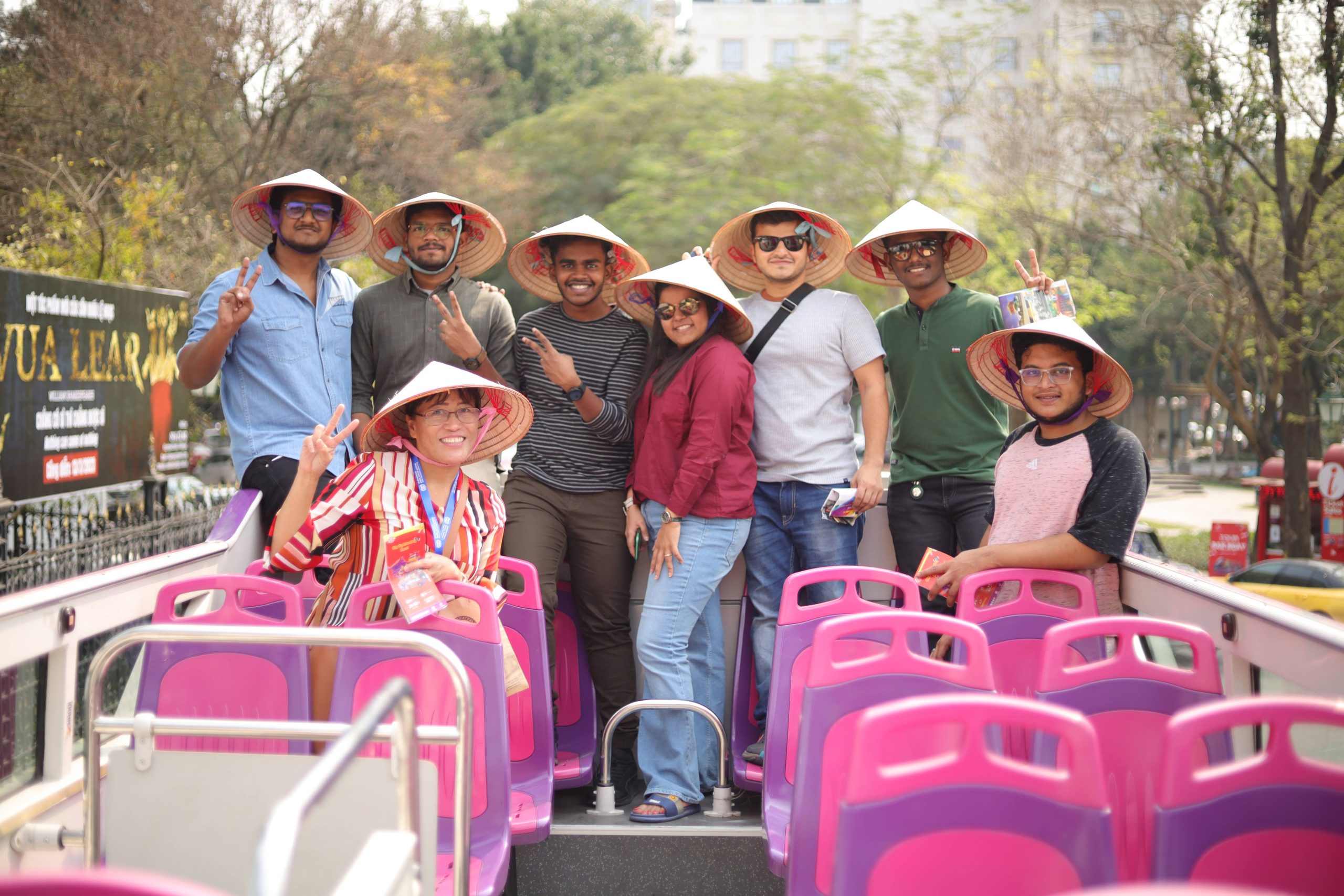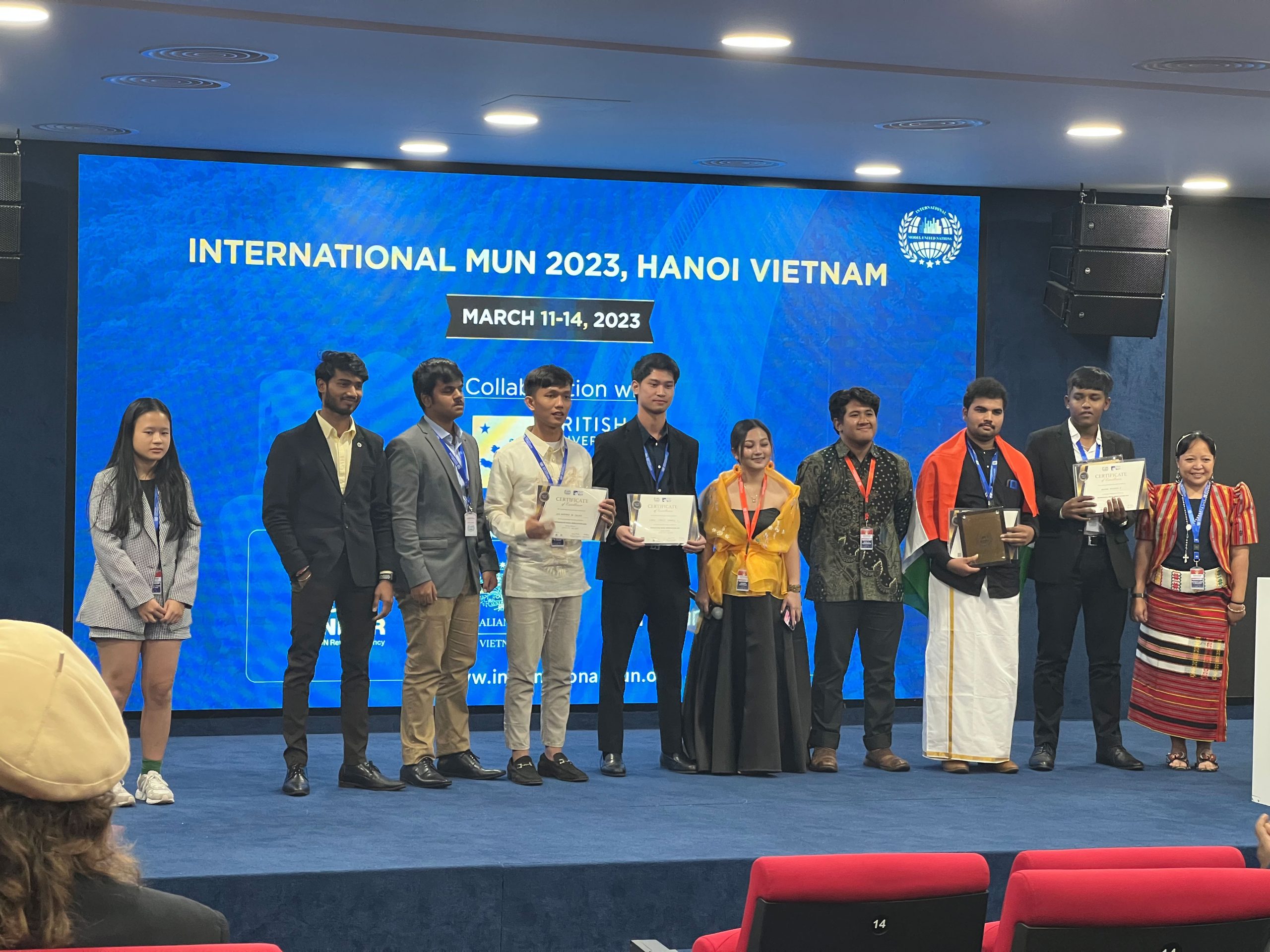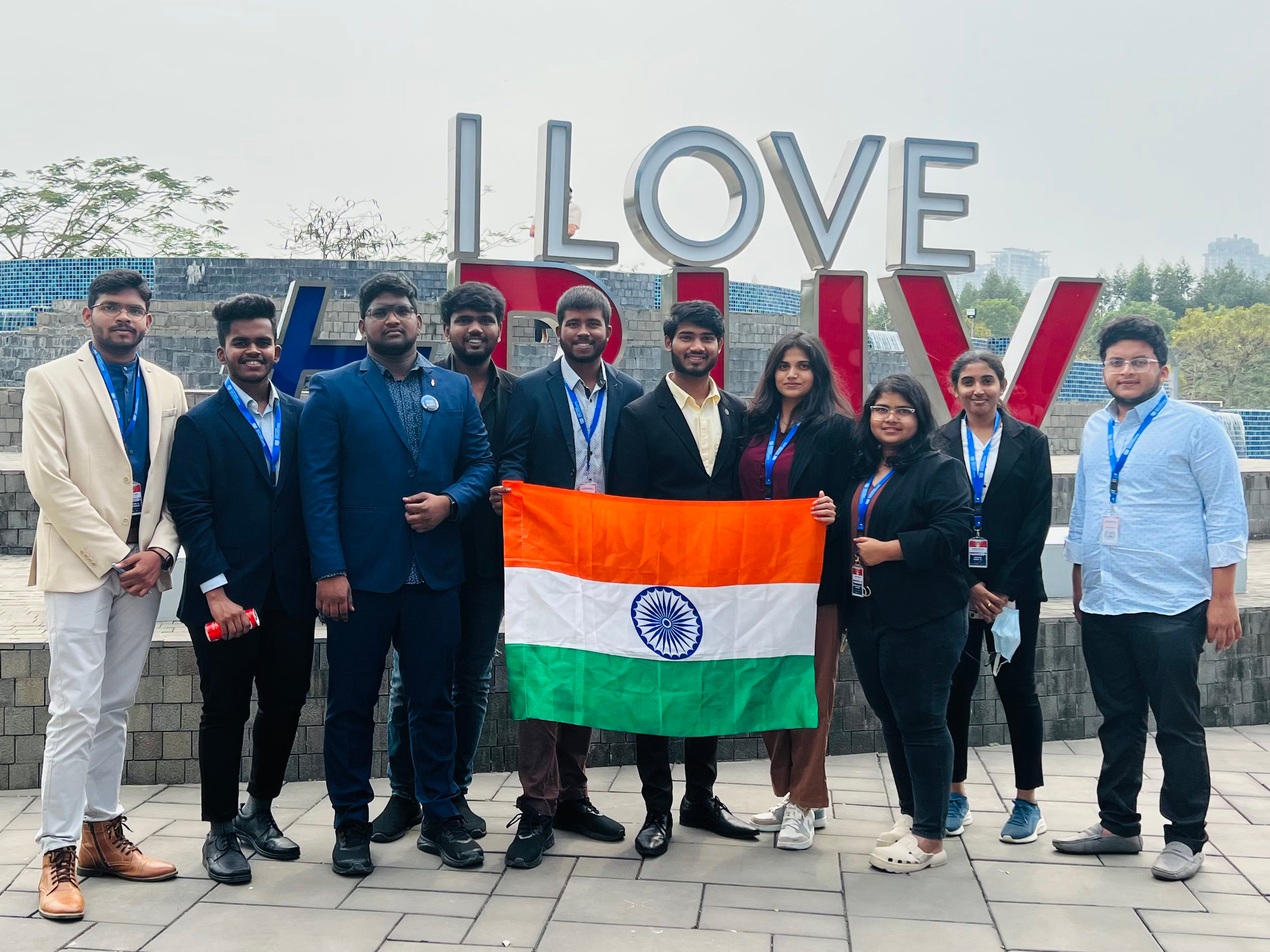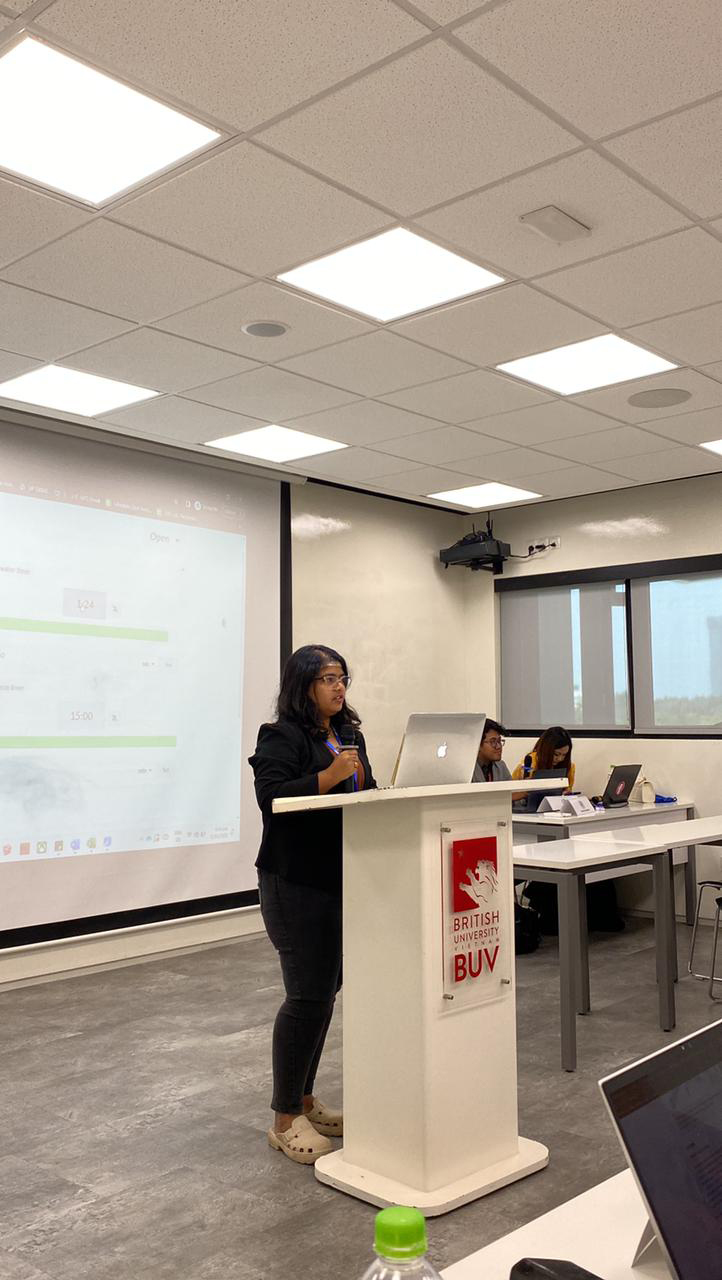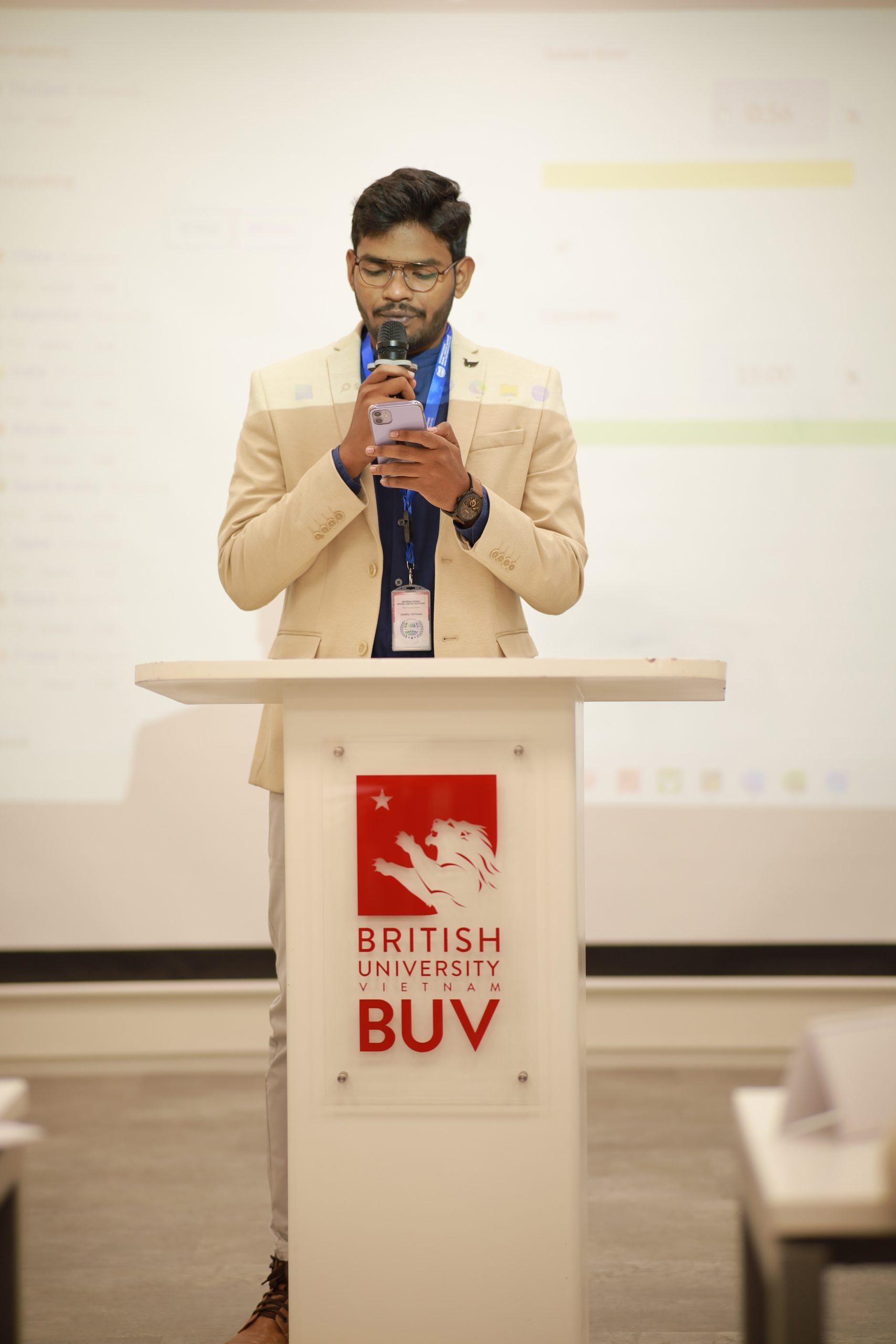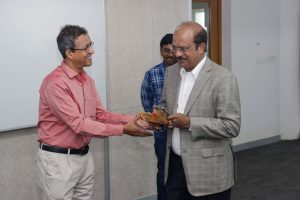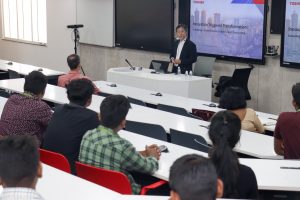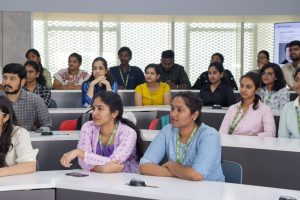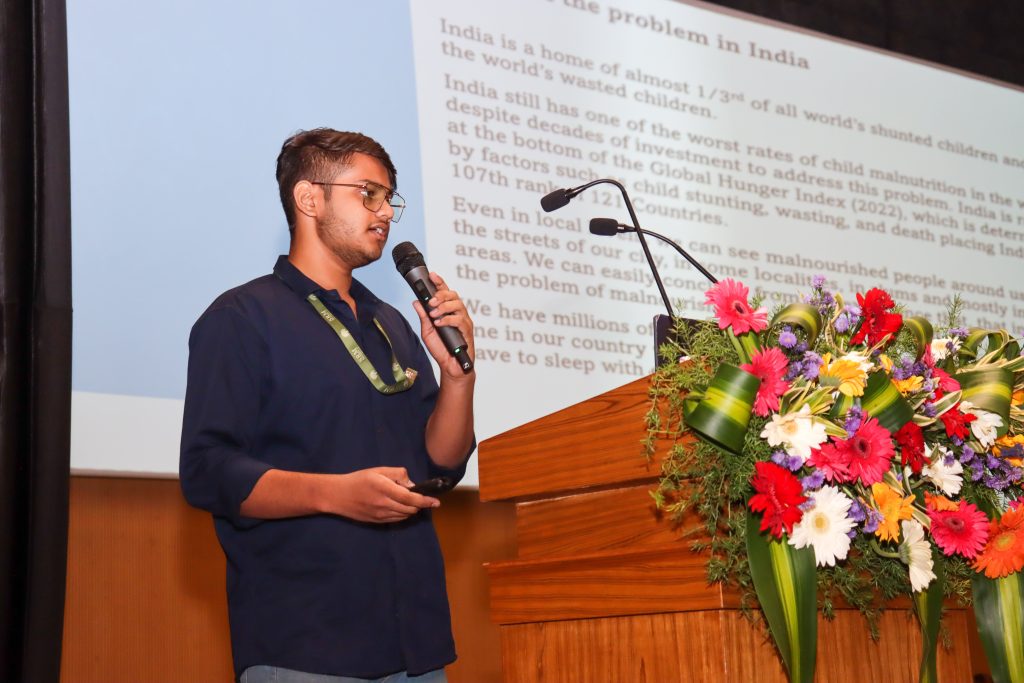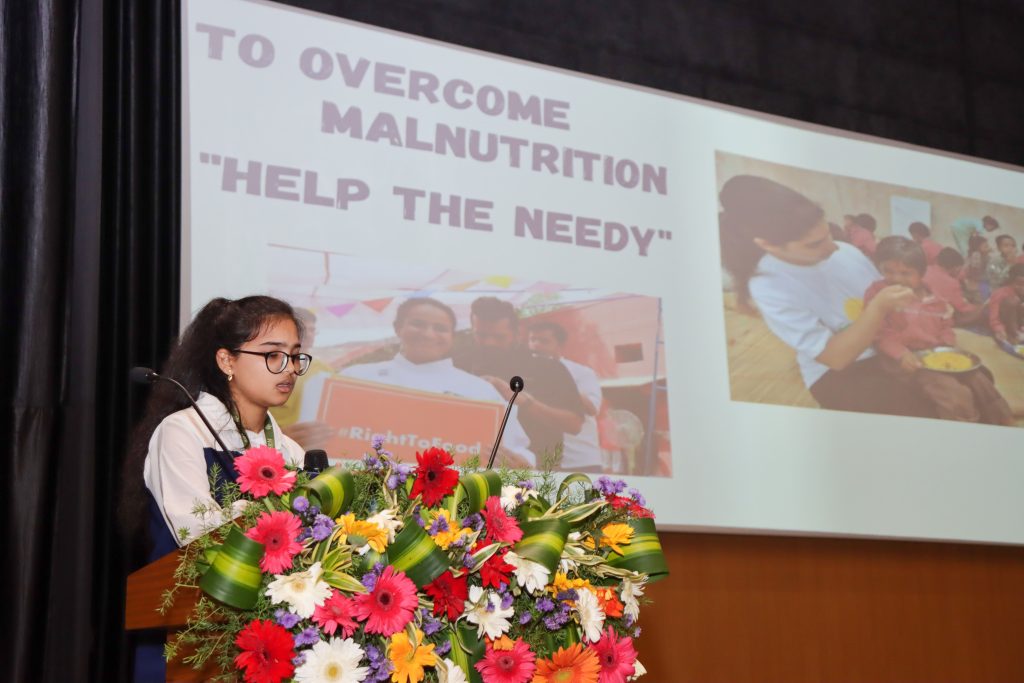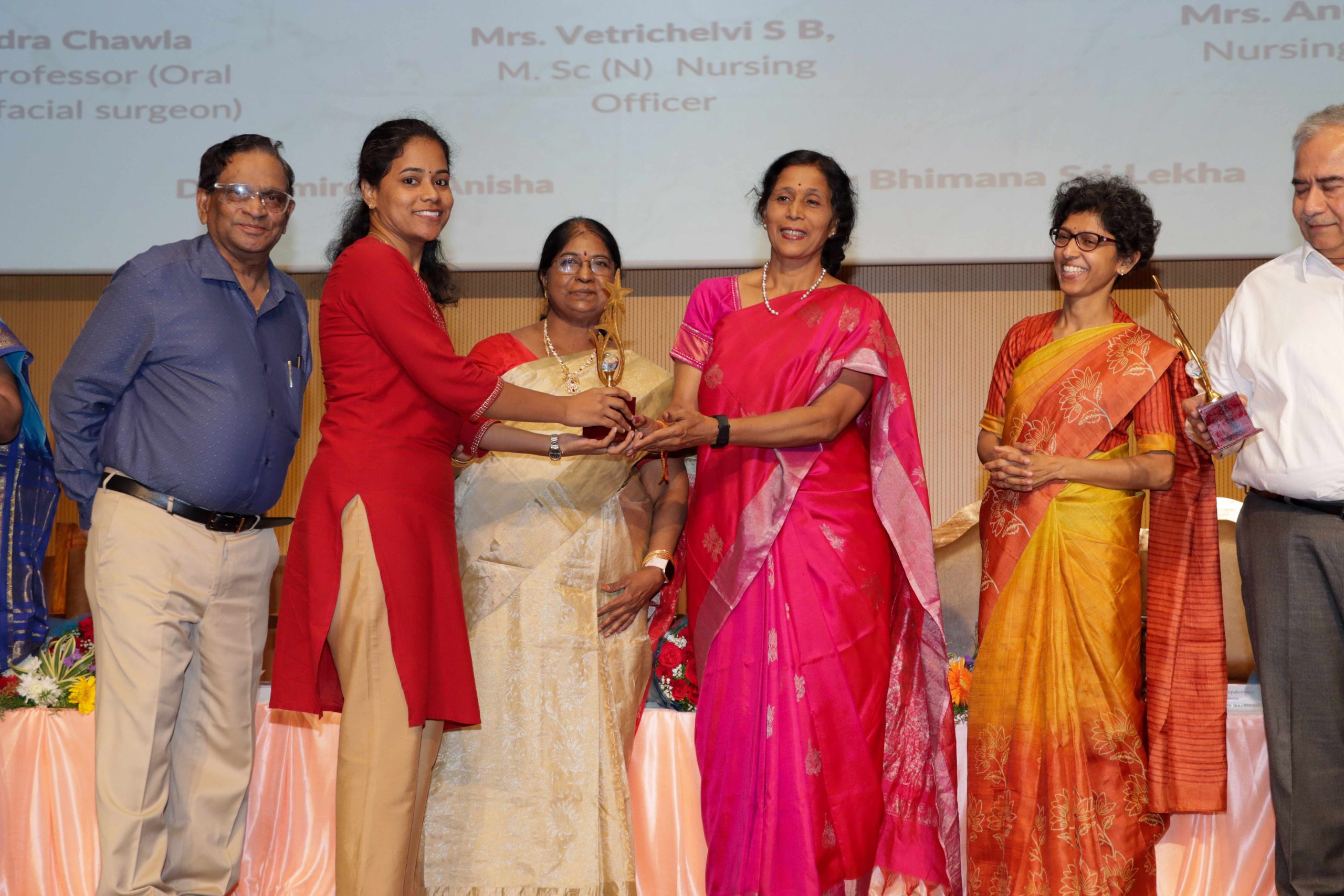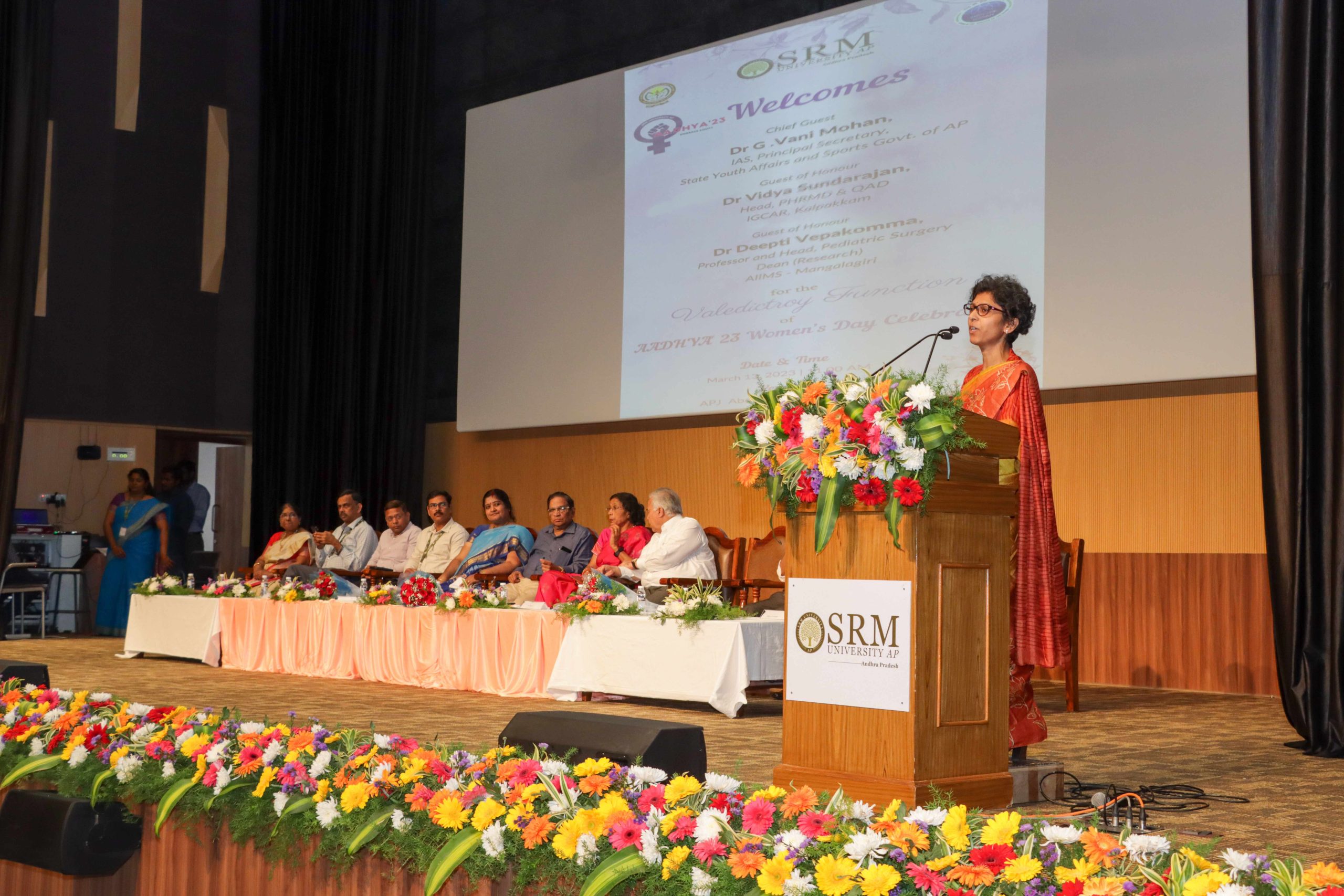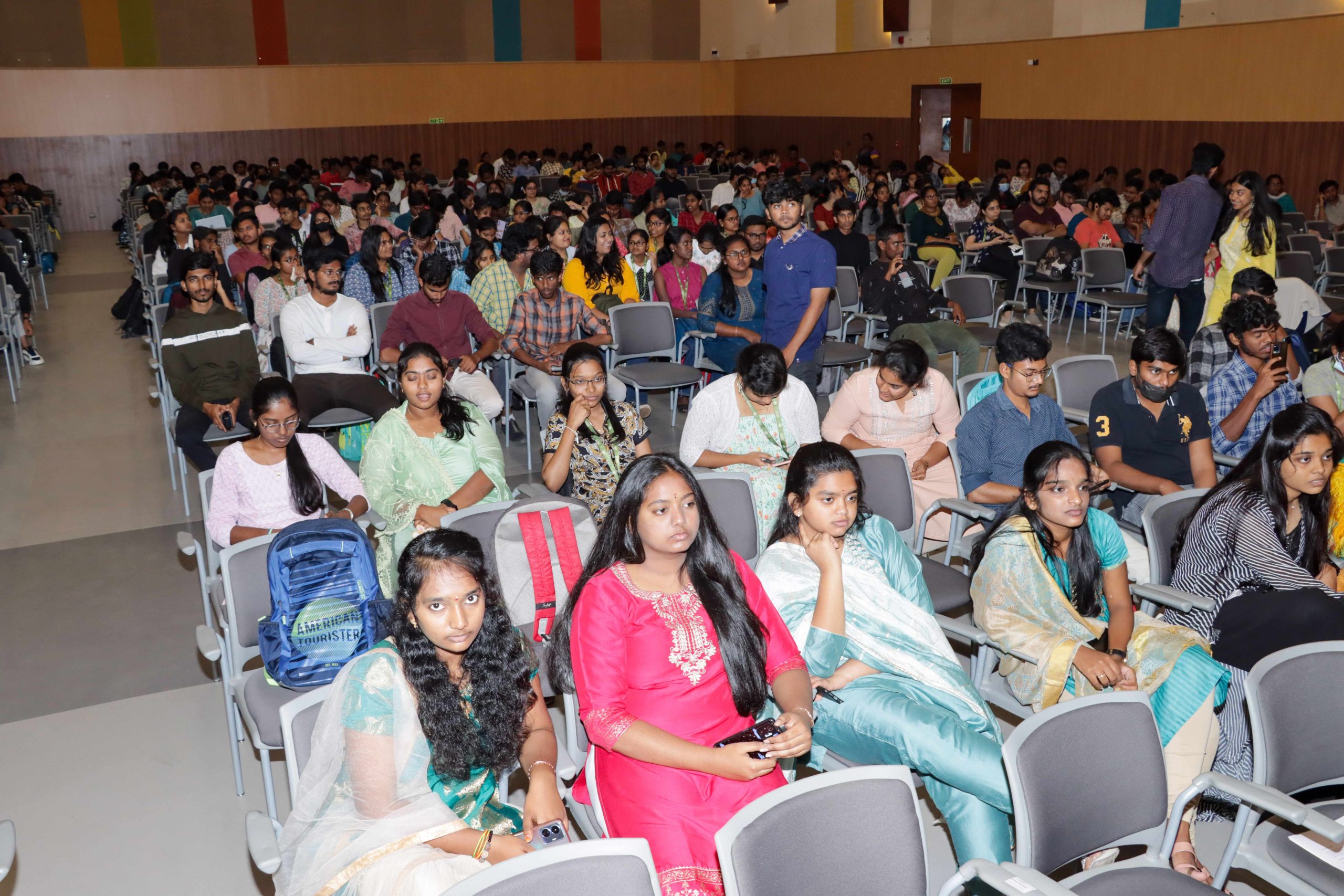All Management Events
- IMUN Appreciation for Students at International Conference in Vietnam March 23, 2023
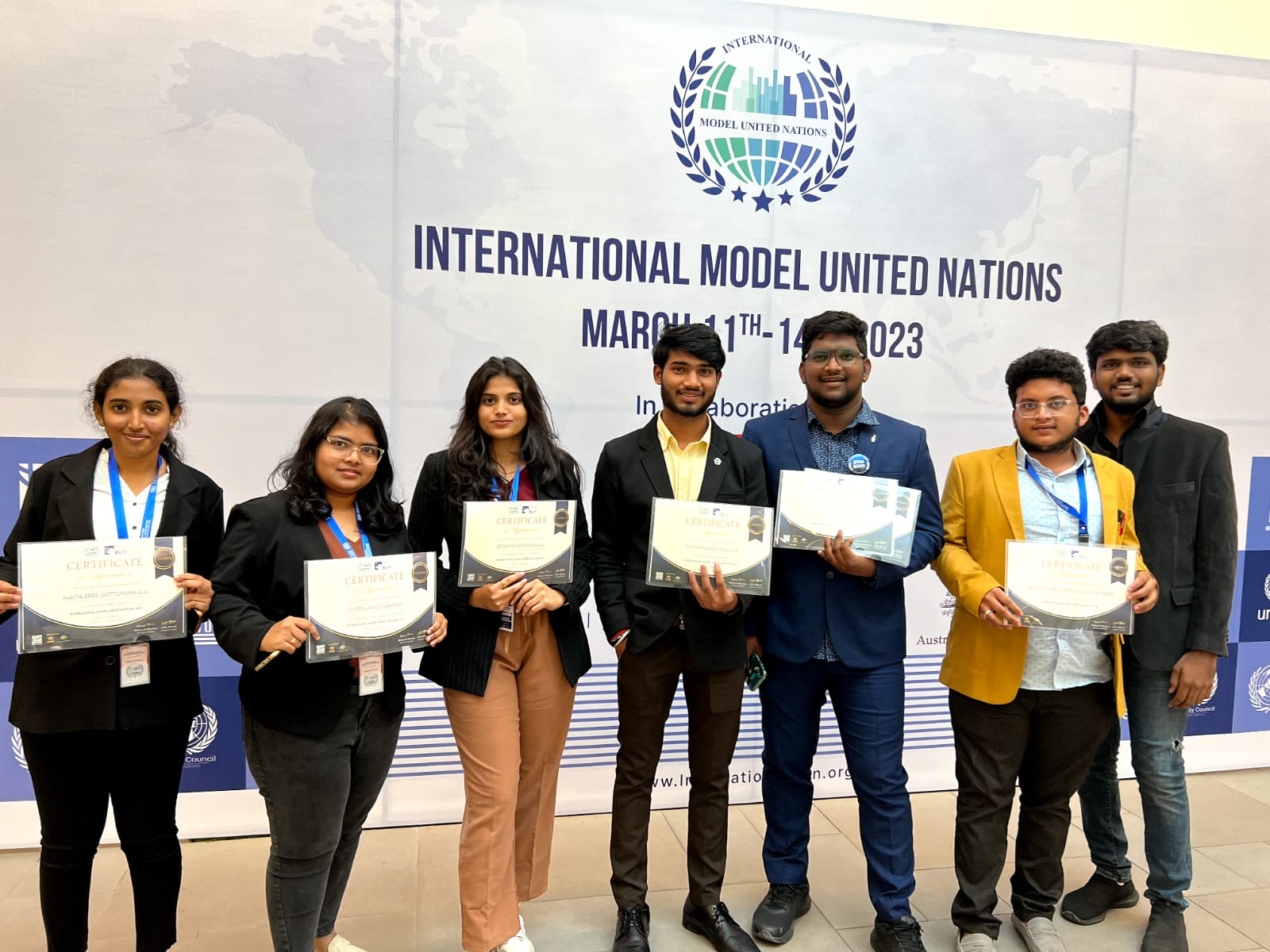 Students of SRM University-AP exhibited incredible talent at the conference organised by the International Model United Nations (IMUN) at the British University in Vietnam from March 11 to 14, 2023. The international conference has been conducted in collaboration with UNICEF, UNO, and UN Women. University students from 35 countries participated in the four-day long conference.
Students of SRM University-AP exhibited incredible talent at the conference organised by the International Model United Nations (IMUN) at the British University in Vietnam from March 11 to 14, 2023. The international conference has been conducted in collaboration with UNICEF, UNO, and UN Women. University students from 35 countries participated in the four-day long conference.Durgapraveen, Eeshitha, Sahana, Navya, Praveen Kumar, Venugopal, Satwik Suhas, Nitish, Rameez and Satwik Sai were the students of SRM University-AP who participated in the conference. Students prepared detailed draft copies on contemporary social issues and engaged in group discussions with students from different countries to showcase their potential. Along with students from other countries, they presented a report with details on social problems like cancer treatment, mental health problems, and child marriage and their solutions. The committee considered these the best presentations and handed over certificates of appreciation. Pro-Chancellor, Dr P Sathyanarayanan; Vice Chancellor, Prof. Manoj K Arora; Director of International Relations and Higher Studies, Dr Naga Swetha Pasupuleti; and others praised the students who made the varsity’s voice heard at the international conference.
The conference was part of the 4-day Vietnam Immersion Programme organised by the Directorate of International Relations and Higher Studies of SRM AP. The programme featured 10 students from the university. Diplomatic Talk from the embassies on recent global issues, MUN 101 and Training Sessions for the participants, Paper presentations on UNDP, WHO, UNSC, UNICEF, UNWoman & UNESCO, Social Night, cultural exchange, and networking with global participants, and Educational City Tour to explore the capital city, Hanoi were the highlights of the immersion programme.
Continue reading → - Developing and Implementing Successful Marketing Strategies for Executives March 23, 2023
“Intellectual growth should commence at birth and cease only at death- Albert Einstein”.
In today’s business world, technology is driving change, which in turn requires professionals to continuously upgrade their skills to stay efficient and relevant. Executive programmes, when well-designed, can be instrumental in this process by not only helping professionals acquire new skills, but also by facilitating the creation of a valuable peer network. The curriculum of executive programmes is specifically designed to impart knowledge and skills necessary for executives to excel amidst the challenges of the current business environment.
Focus of Executive Education Programmes?
The modern business world is in a constant state of evolution, with new dynamics emerging that require professionals to learn new skills and adapt to changing conditions. Some of these dynamics include:
Technological Advancement: Technological innovations are driving business growth and creating new opportunities at a rapid pace. Professionals who fail to keep up with these advancements risk becoming irrelevant.
Cut-throat Competition: The current business environment is characterised by intense competition, with new players entering the market and disrupting traditional business models.

Well-aware consumers: Modern consumers are well informed and have higher expectations from organisations. To remain competitive, businesses must adapt to changing consumer demands.
Agility and Adaptability: Due to the dynamic nature of the business environment, organisations are expected to be flexible and able to adapt to changing market conditions and consumer preferences. As a result, businesses expect their employees to be up-to-date, adaptable, and tech-savvy. In the light of this, executive education programmes focus on addressing the challenges posed by the emerging dynamics. Some of the focused areas are:
Leadership Development: To navigate the challenges of the modern business world, there is a growing need for confident and effective leaders. Executive programmes focus on developing leadership qualities among their students..
Digital Learning and Analytics: Data analytics has become increasingly important in business decision-making. Executive programmes provide training on software and tools that can help executives analyse and interpret data.
Entrepreneurship Skills: Innovative thinking and entrepreneurial skills are essential for driving business growth. As a result, executive programmes focus on developing these skills among their students.
Social Responsibility: Business organisations have a role to play in addressing social problems. Hence, executive programmes sensitise the students about the social issues and train them to contribute to social good.
EMBA- A Complete Package.
Executive MBA (EMBA) programmes are offered by numerous reputable institutions worldwide, with the goal of bridging the gap between executives’ current skillsets and the skills they need to excel in their careers. The EMBA curriculum is highly practical and emphasises the development of leadership qualities, data-driven decision-making, innovation, risk-taking, and more. Additionally, EMBA programmes offer courses in business ethics, which teach students to act responsibly in their business practices.
Continue reading →
Individuals who enrol in an EMBA programme will engage in courses grounded in leadership and strategic theories. They will learn how to utilise critical thinking to make informed business decisions and establish relationships with peers to expand their professional networks. In summary, EMBA programmes provide an excellent opportunity for professionals to upgrade their skills, build strong networks, and advance in their careers. - International Conference at the British University in Vietnam: Students of SRM University Get IMUN Appreciation for Being the ‘Best Commentators’ March 23, 2023
Deccan Chronicle
Continue reading →

The Hindu

The Pioneer

News India Express
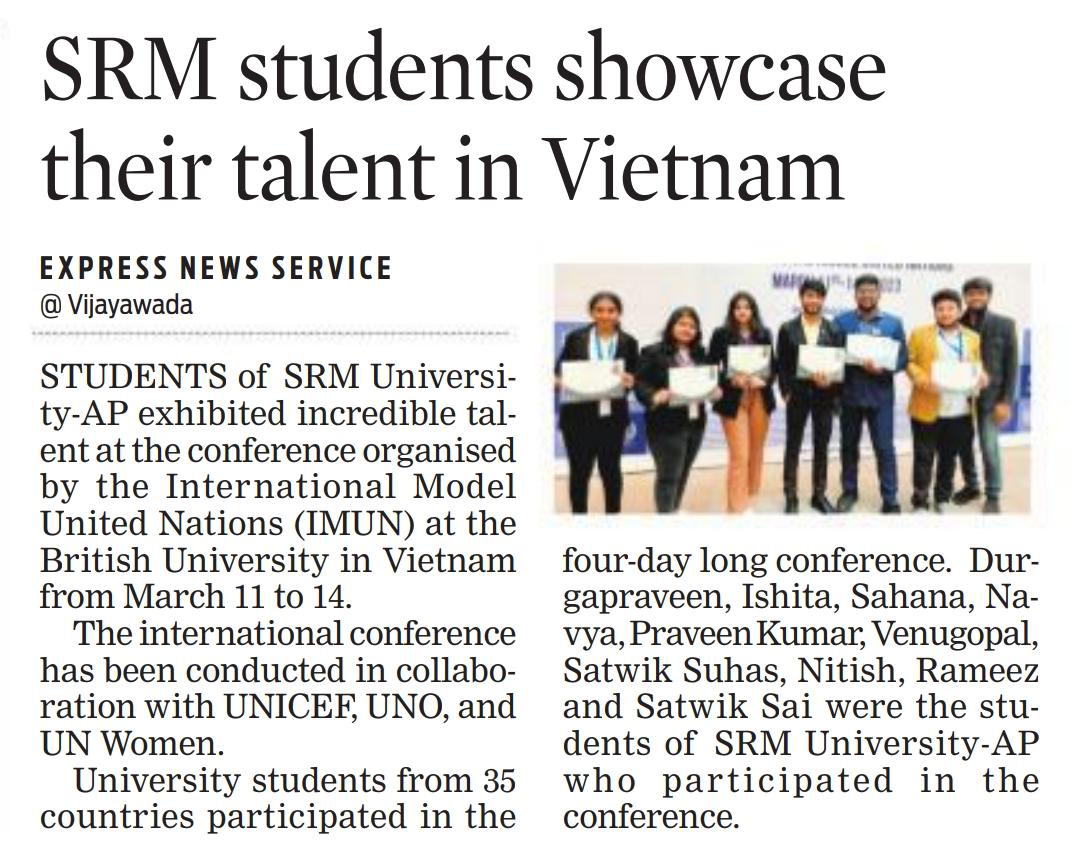
The Hans India
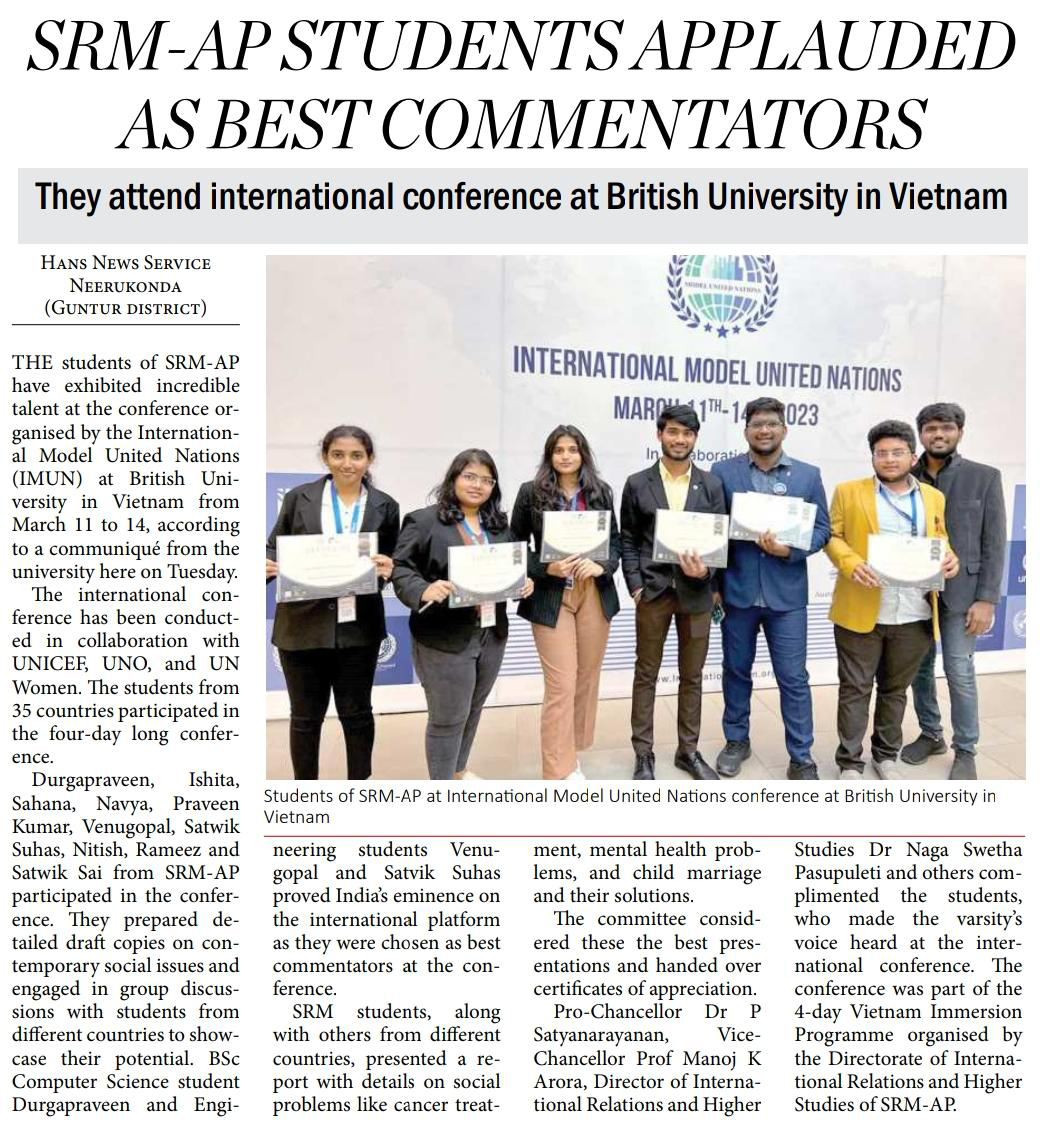
Eenadu
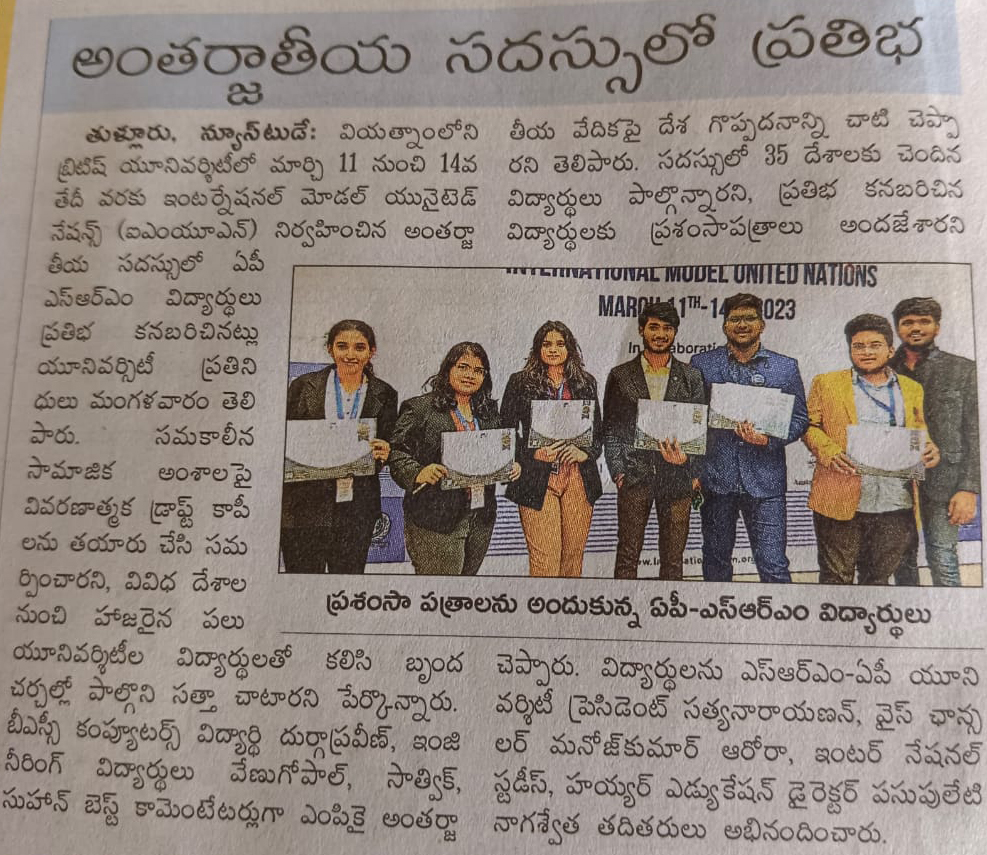
Visalandhra
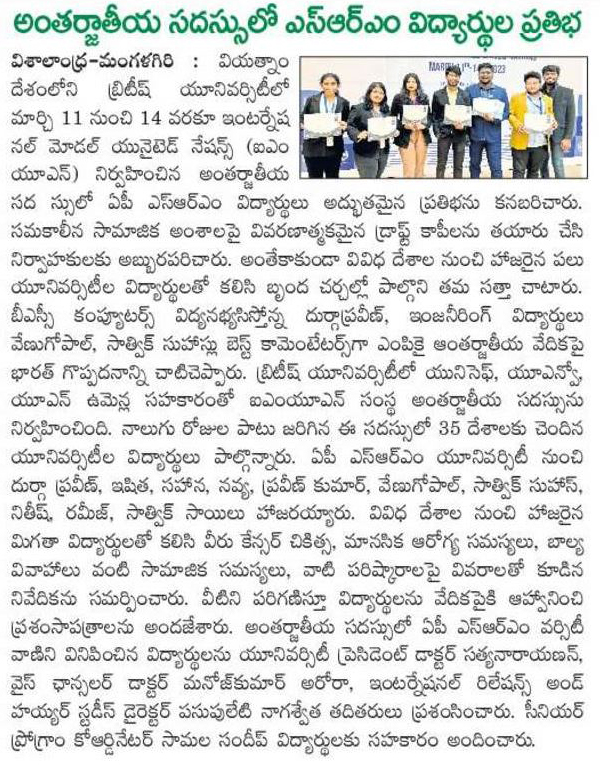
Vartha
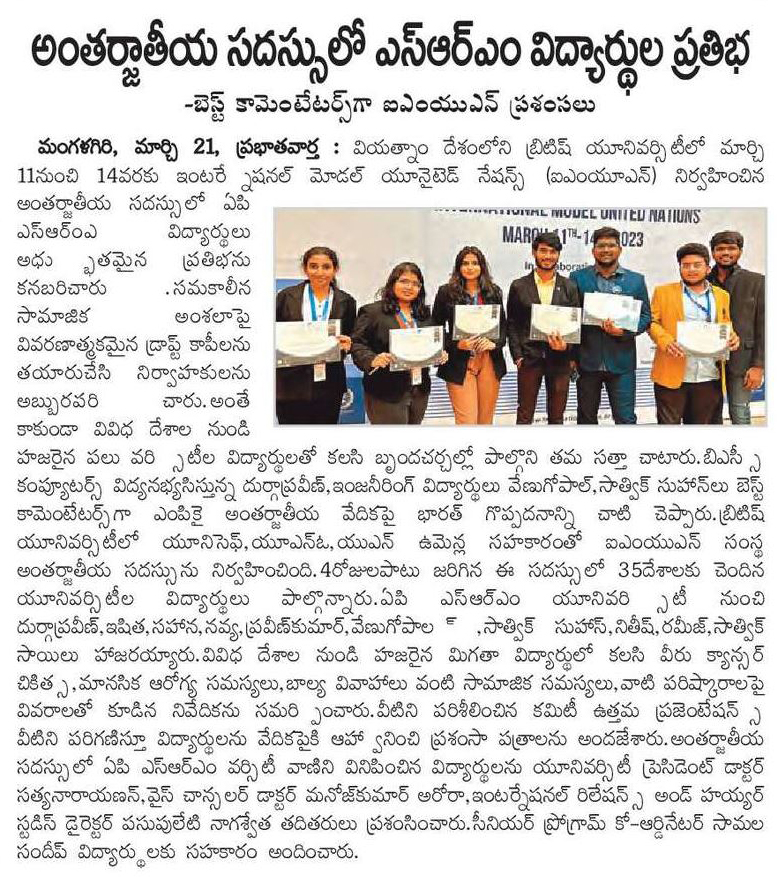
Surya
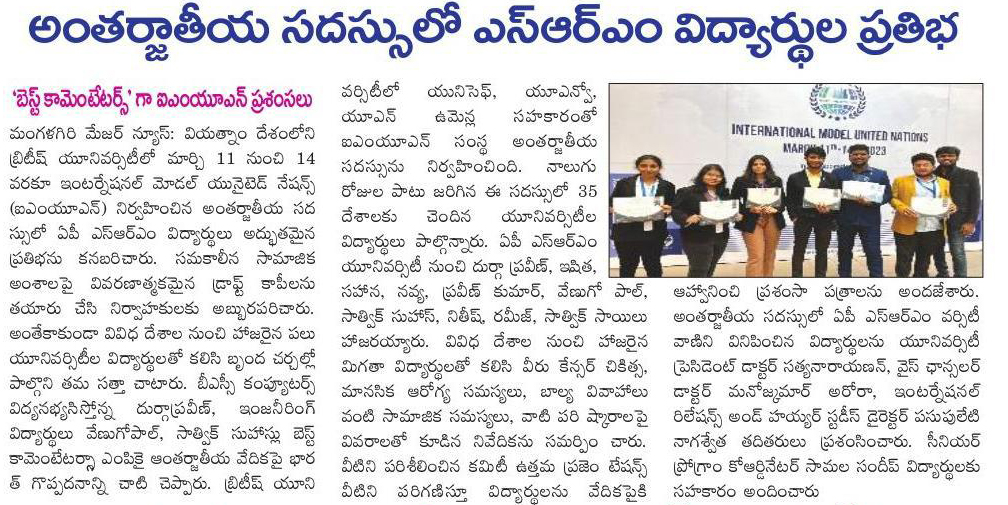
Andhra Patrika
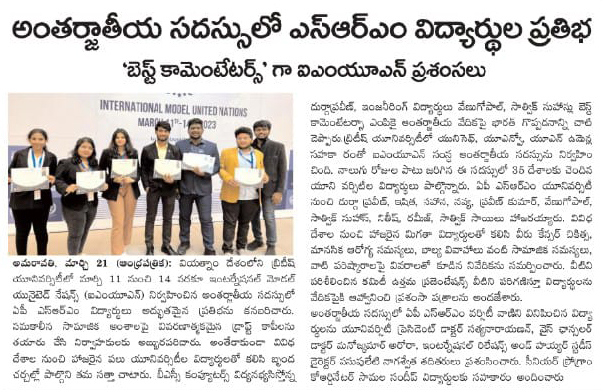
- Maximising Electrochemical NH3 Production March 21, 2023
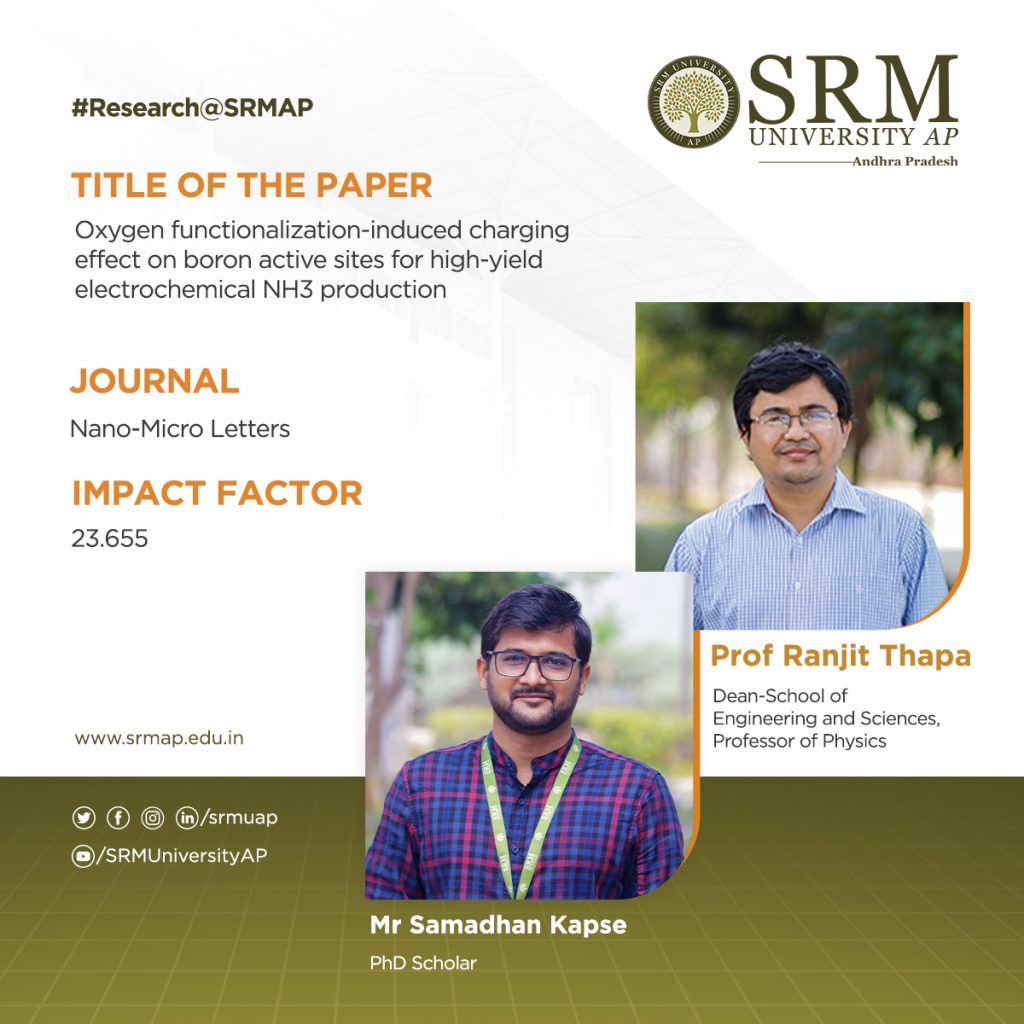
Significant measures have been undertaken to synthesise ammonia proficiently, the future renewable energy fuel for its wide range of applications in various sectors. On this account, a research paper titled “Oxygen functionalization-induced charging effect on boron active sites for high-yield electrochemical NH3 production” has been published by Prof. Ranjit Thapa, Professor, Department of Physics and his research scholar Mr Samadhan Kapse in the journal Nano-Micro Letters having an impact factor of 23.655.
Abstract
Ammonia has been recognized as the future renewable energy fuel because of its wide-ranging applications in H2 storage and transportation sector. In order to avoid the environmentally hazardous Haber–Bosch process, recently, the third-generation ambient ammonia synthesis has drawn phenomenal attention and thus tremendous efforts are devoted to developing efficient electrocatalysts that would circumvent the bottlenecks of the electrochemical nitrogen reduction reaction (NRR) like competitive hydrogen evolution reaction, poor selectivity of N2 on the catalyst surface. Herein, we report the synthesis of an oxygen-functionalised boron carbonitride matrix via a two-step pyrolysis technique. The conductive BNCO(1000) architecture, the compatibility of B-2pz orbital with the N-2pz orbital and the charging effect over B due to the C and O edge-atoms in a pentagon altogether facilitate N2 adsorption on the B edge-active sites. The optimum electrolyte acidity with 0.1 M HCl and the lowered anion crowding effect aid the protonation steps of NRR via an associative alternating pathway, which gives a sufficiently high yield of ammonia (211.5 μgh−1 mgcat−1) on the optimized BNCO(1000) catalyst with a Faradaic efficiency of 34.7% at −0.1 V vs RHE. This work thus offers a cost-effective electrode material and provides the contemporary idea about reinforcing the charging effect over the secured active sites for NRR by selectively choosing the electrolyte anions and functionalizing the active edges of the BNCO(1000) catalyst.
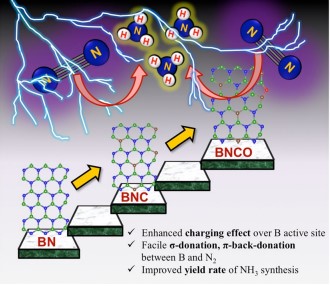
A brief summary of the research in layman’s terms
In summary, this work displayed the significant role of O and C doping within BN architecture to promote NRR on the edge B sites via an associative alternating mechanism. The gradual formation of the ideal structure was systematically studied by means of XPS and the electronic properties was investigated from NEXAFS. A greater impact was found on the charging effect of B centres due to O-functionalized edges that induced a greater charge density from B to the adsorbed N2, overcoming the potential determining steps for NRR. This work simultaneously highlighted the importance of the choice of electrolyte, where in 0.1 M HCl our catalyst BNCO(1000) yielded 211.5 μg h−1mgcat−1 of ammonia at −0.1 V vs RHE with a FE of 34.7%. It was experimentally found and theoretically supported that the bulky anions in H2SO4 and H3PO4 blocked the B active sites by a Lewis acid-base interaction between the B sites and the O ends of the anions, hence not suitable for this class of materials. Thus, the present work offered an overall idea of catalyst designing and the medium to retain a high and consistent NRR performance.
Social implications of the research
Nitrogen reduction reaction (NRR) performed electrochemically is regarded as a green and legitimate approach to ammonia synthesis and it has been intrinsically brought into the limelight by the worldwide research community, not only because of the immense use of ammonia in the agriculture and transportation sector but also due to urge to resolve the fallacies associated with the process. Primarily, the eternal problem persisting with NRR is the predominance of the combative hydrogen evolution reaction (HER) at the same potential range, which overpowers NRR over most of the catalyst surfaces, resulting in poor yield and Faradaic efficiency (FE) of ammonia production. Researchers thus majorly focus on varied catalyst development, which includes several strategies: (a) Selectivity of elements that would prefer binding with N2 over protons, (b) Blocking the HER active sites, (c) Phase-selective material designing, inhibiting HER at the active surface, (d) interface-engineering that would deviate the HER pathway inducing better Faradaic efficiency for NRR. Although either 1st-row transition metals or semimetals are regarded as more suitable candidates for NRR, a metal-free approach is rather preferred for the cost-effectiveness and simplicity of the process. Boron (B)-based electrocatalyst in this respect can act as a strong contender. The research also posits that Density functional theory is useful for the molecular level understanding to unveil the performance of different catalytic reactions.
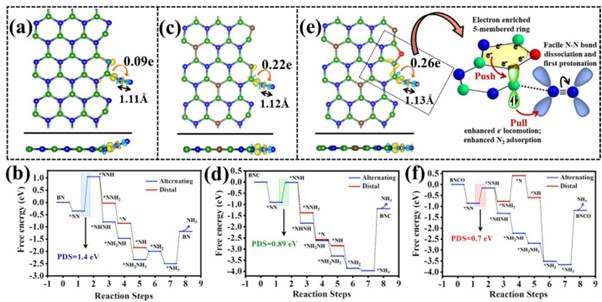
Collaborations
- Ms Ashmita Biswas, Institute of Nano Science and Technology (INST), Sector-81, Mohali, Punjab 140306, India
- Mr Ramendra Sundar Dey, Institute of Nano Science and Technology (INST), Sector-81, Mohali, Punjab 140306, India
- Dr Saswat Kumar Ram March 20, 2023
- Dr Sandra Roshni Monteiro March 20, 2023
- “Your Career in Business”- Insights from Mr Takashi Ishikawa March 16, 2023
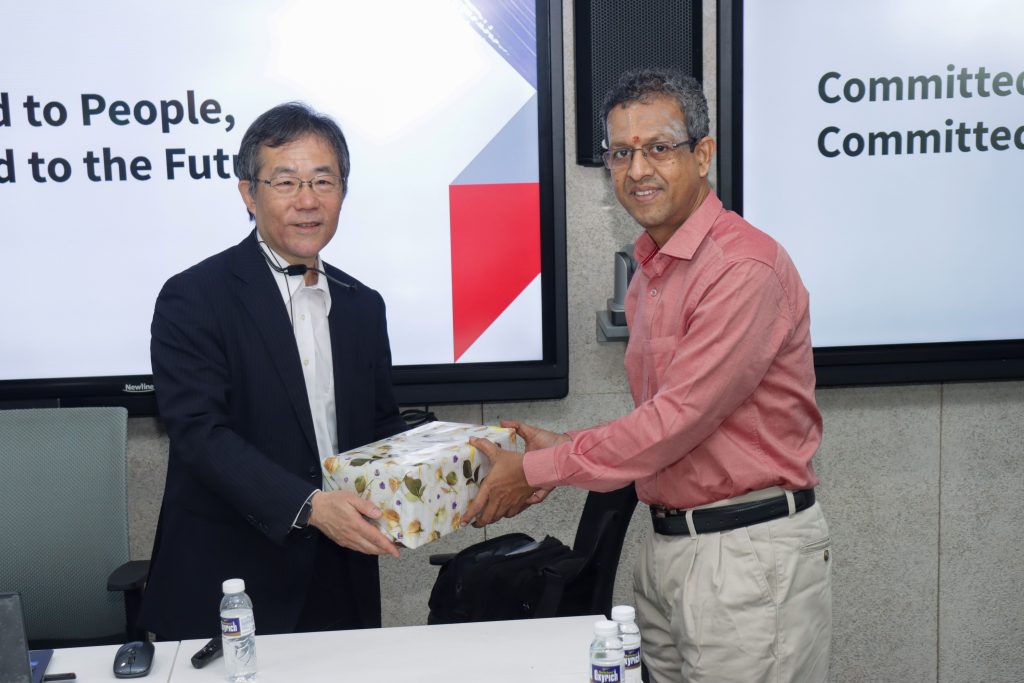
Visits from Big Techs offer an opportunity for young and potential students of management to develop future aspirations and shape their careers. The Paari School of Business organised a visit from the Tech Giant Mr Takashi Ishikawa, the Managing Director and Chairman of Toshiba Software India on March 06, 2023. The experienced business leader interacted with students and shared insight on prospective career opportunities and employment strategies for budding business managers. He encouraged students to explore different career paths and pursue their passions and interests. Mr Ishikawa emphasized the importance of continuous learning and development and encouraged students to pursue lifelong learning and stay current with the latest industry trends and technologies.
Mr Ishikawa also discussed the company’s recent developments and initiatives, including its focus on digital transformation and the development of innovative technologies. In addition to discussing the company’s initiatives. The visit has proved to be a beneficial opportunity for students to learn about the regional ecosystem of Toshiba Software and gain insights on career development from a seasoned industry leader. His emphasis on collaboration, innovation, and lifelong learning serves as a valuable reminder of the skills and qualities necessary for success in today’s dynamic business environment.
Continue reading → - Workshop on Sustainable Development at SRM University-AP March 15, 2023
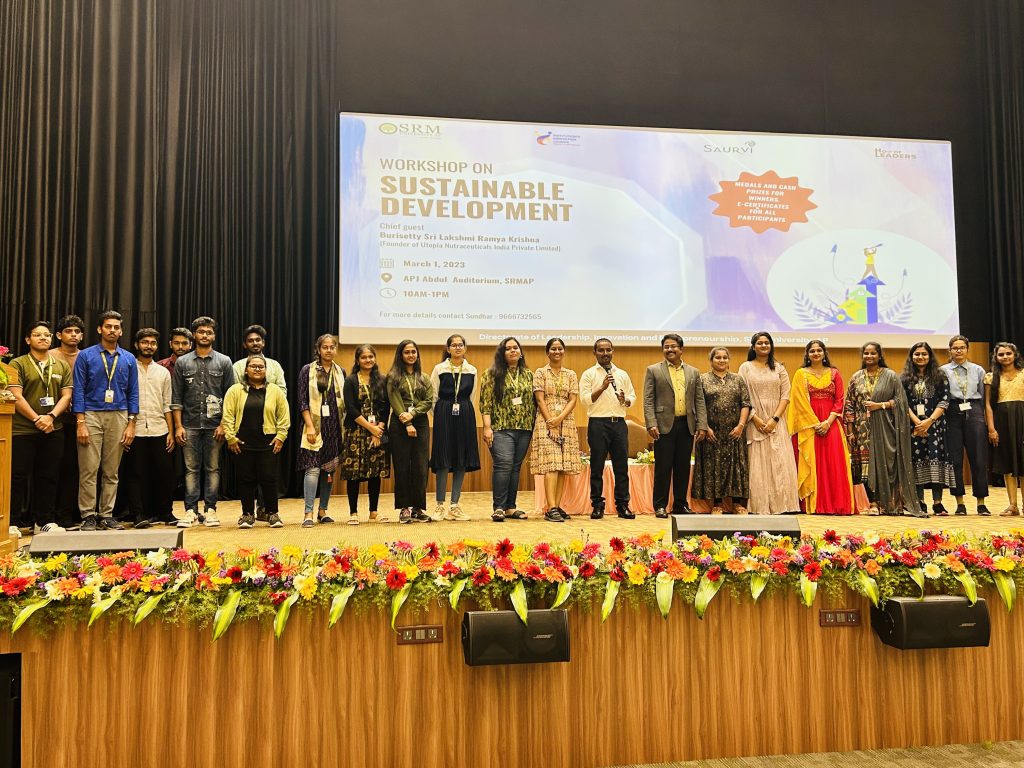
Sauri, the woman leadership and entrepreneurship student community of SRM University-AP, in association with the Directorate of Entrepreneurship and Innovation conducted a Workshop on Sustainable Development on March 01, 2023 to promote an insightful discourse on SDGs and develop strategies advocating green development. The workshop was an ideal platform facilitating knowledge and insight into the challenges on formulating a development plan that meets the needs of the present, without compromising the ability of future generations to meet their own needs. Student presentations on the problem statements regarding Sustainable development were a major highlight of the workshop.
The Chief Guest of the workshop Mrs Ramya Krishna Burisetty gave a brief description and a presentation regarding her startup venture and sustainable development. She also gave a comprehensive overview on her journey, background work, ideology behind her startup, ways to build start-ups and the technology of fortifying foods. Being a women entrepreneur, she also motivated students by providing them with guidelines for the funding sources available for women entrepreneurs.
The workshop was attended by 350+ students from various colleges. Students from VVIT, VIT-AP, VR Siddhartha Engineering College, NRI Institute Of Technology and KL University actively participated in multiple activities organised as part of the workshop. A quiz was conducted as well as presentations based on their ideas on the given problem statements. Mr Dinesh and team from VVIT bagged the first prize and Ms Sindhuja from SRM AP took home the second prize in the quiz competition. The third prize was awarded to two teams, Mr Eeshwar from NRIIT and Ms Ridhi from SRM AP. The students gained knowledge about how to build a startup keeping in mind the goals of Sustainable development. The top five participants with high scores and accuracy were also awarded with deserving prizes.
Continue reading → - Meeting the Immediate Healthcare Needs of the Underprivileged: SRM University-AP Wraps the Week-long Free Health Camp March 15, 2023
The Pioneer
Continue reading →
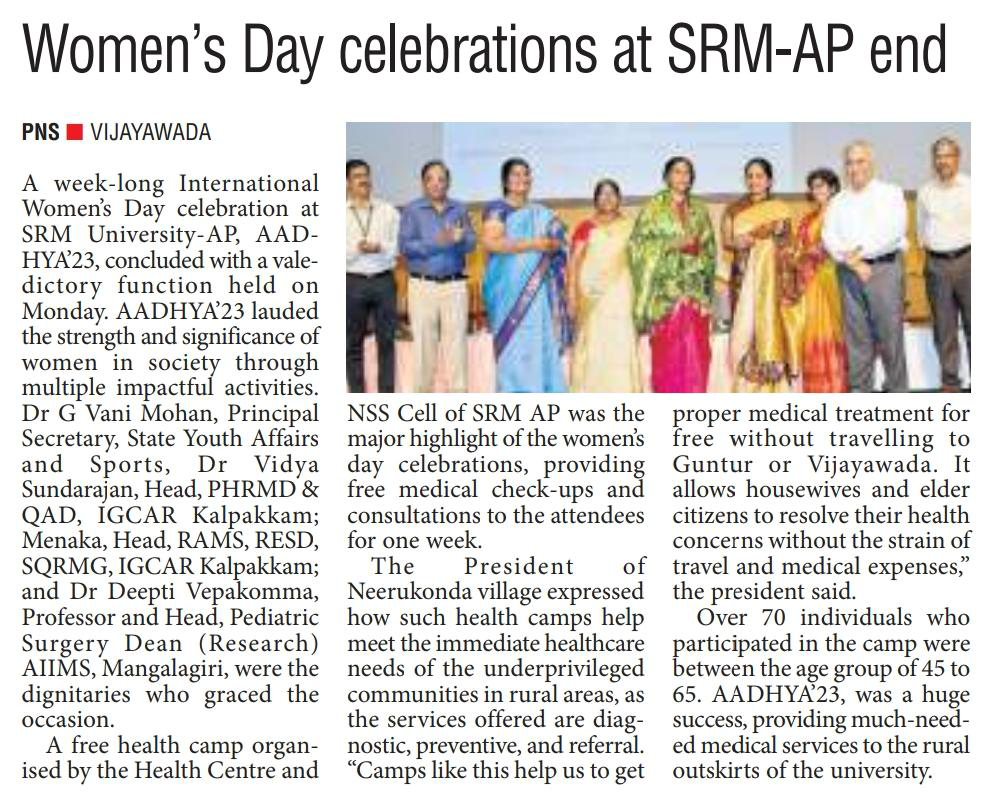
The Hans India
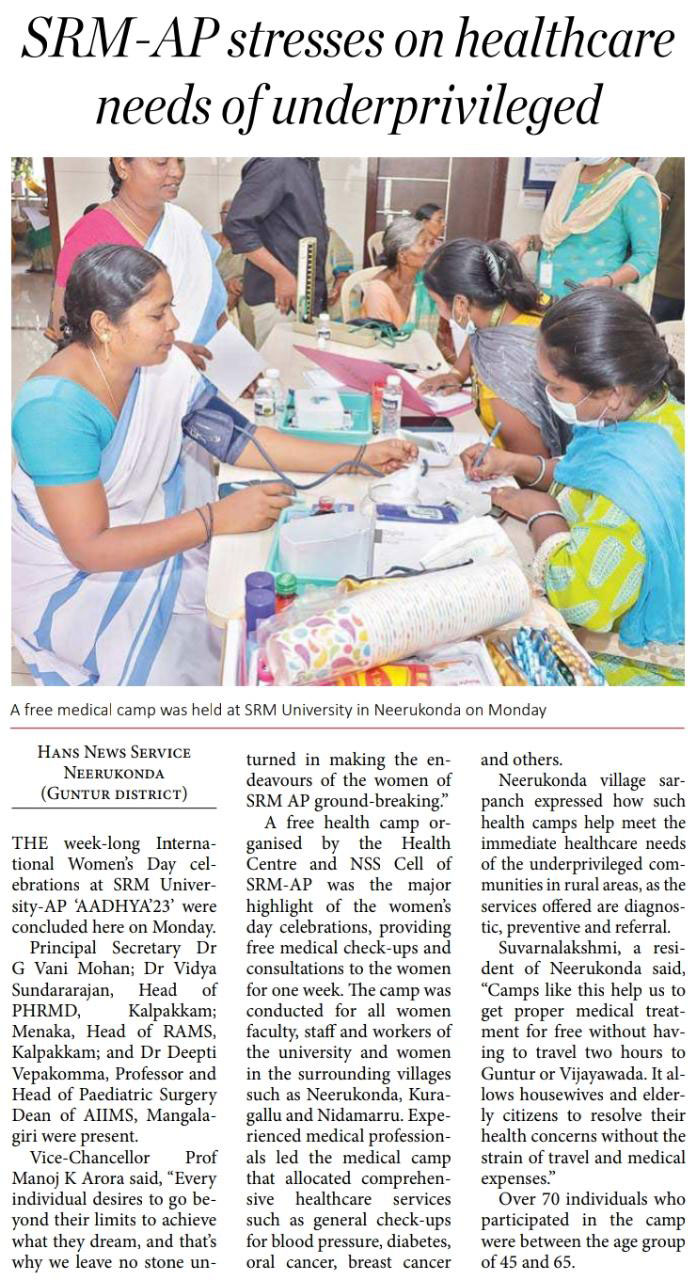
The News Indian Express
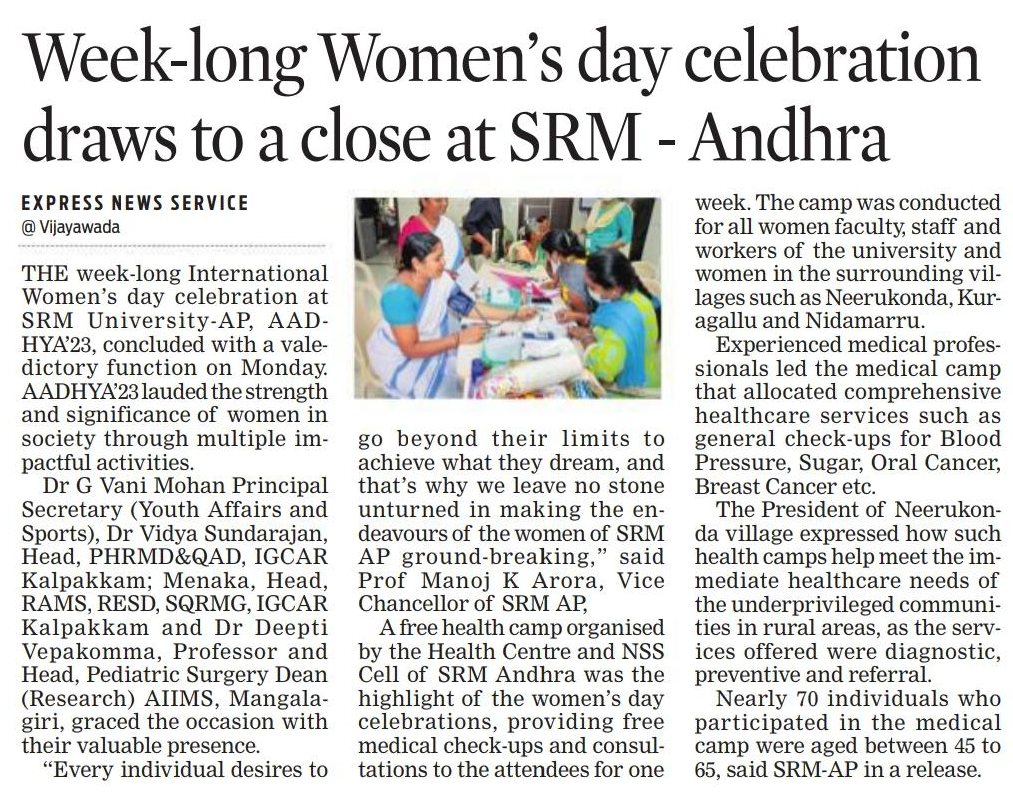
Praja Sakthi
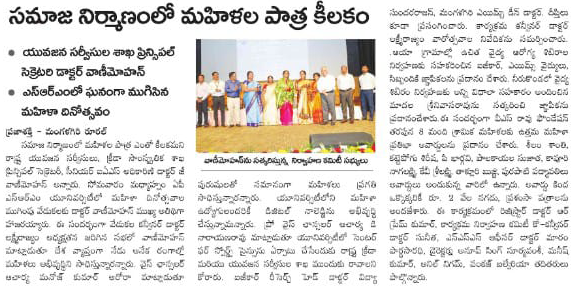
Surya
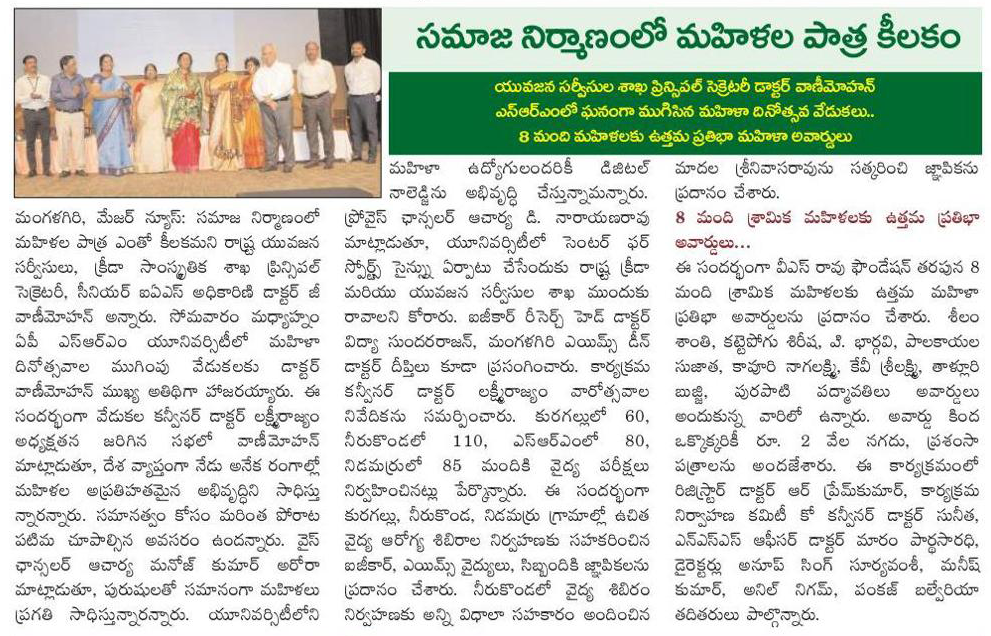
Vartha
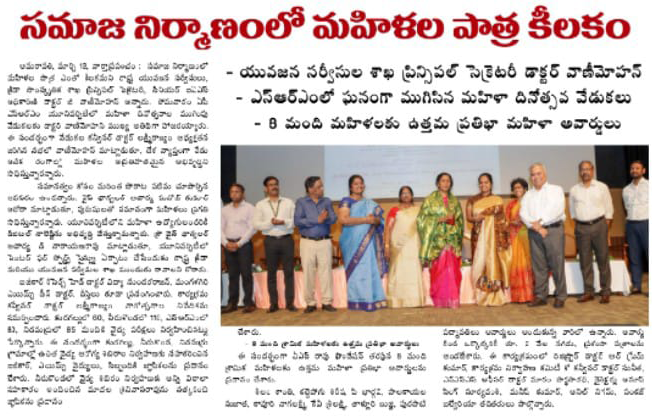
Andhra Jyoti
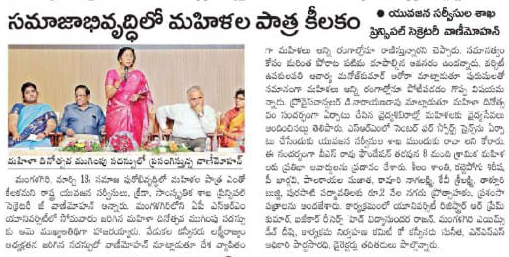
Andhra Patrika
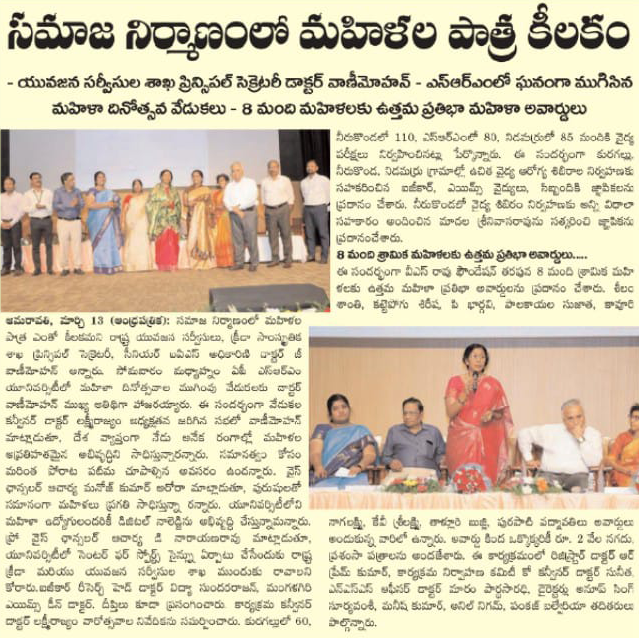
Andhra Prabha
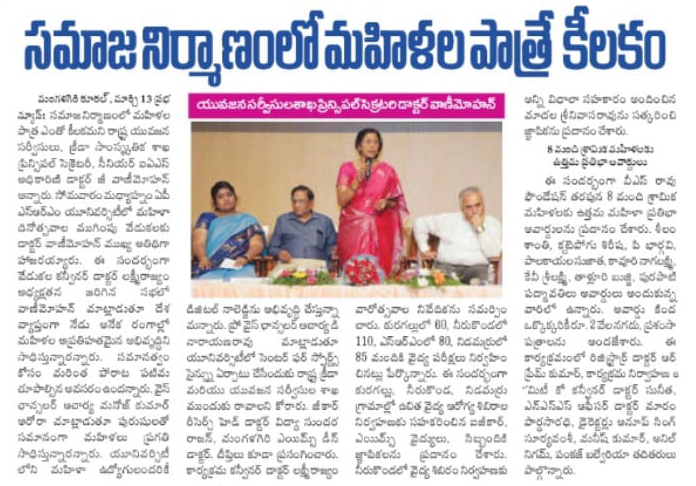
Eenadu
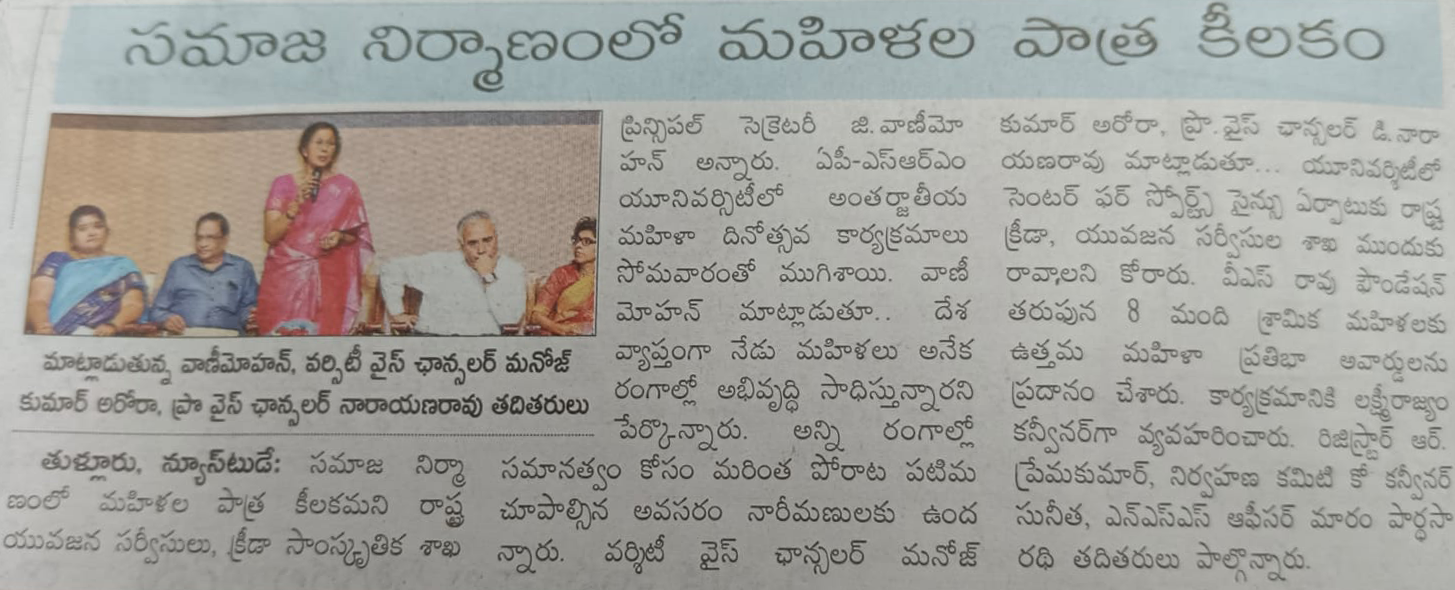
- Meeting the Immediate Healthcare Needs of the Underprivileged March 14, 2023
 A week-long International Women’s day celebration, AADHYA’23, concluded with a valedictory function held on Monday, March 13, 2023. AADHYA’23 lauded the strength and significance of women in society through multiple impactful activities. Dr G Vani Mohan IAS, Principal Secretary, State Youth Affairs and Sports, Govt of Andhra Pradesh; Dr Vidya Sundarajan, Head, PHRMD & QAD, IGCAR Kalpakkam; Ms Menaka, Head, RAMS, RESD, SQRMG, IGCAR Kalpakkam; and Dr Deepti Vepakomma, Professor and Head, Pediatric Surgery Dean (Research) AIIMS, Mangalagiri, were the dignitaries who graced the occasion with their valuable presence. “Every individual desires to go beyond their limits to achieve what they dream, and that’s why we leave no stone unturned in making the endeavours of the women of SRM AP ground-breaking,” said Prof. Manoj K Arora, Vice Chancellor of SRM AP, while addressing the gathering.
A week-long International Women’s day celebration, AADHYA’23, concluded with a valedictory function held on Monday, March 13, 2023. AADHYA’23 lauded the strength and significance of women in society through multiple impactful activities. Dr G Vani Mohan IAS, Principal Secretary, State Youth Affairs and Sports, Govt of Andhra Pradesh; Dr Vidya Sundarajan, Head, PHRMD & QAD, IGCAR Kalpakkam; Ms Menaka, Head, RAMS, RESD, SQRMG, IGCAR Kalpakkam; and Dr Deepti Vepakomma, Professor and Head, Pediatric Surgery Dean (Research) AIIMS, Mangalagiri, were the dignitaries who graced the occasion with their valuable presence. “Every individual desires to go beyond their limits to achieve what they dream, and that’s why we leave no stone unturned in making the endeavours of the women of SRM AP ground-breaking,” said Prof. Manoj K Arora, Vice Chancellor of SRM AP, while addressing the gathering.A Free Health Camp organised by the Health Centre and NSS Cell of SRM AP was the major highlight of the women’s day celebrations, providing free medical check-ups and consultations to the attendees for one week. The camp was conducted for all women faculty, staff and workers of the university and women in the surrounding villages such as Neerukonda, Kuragallu and Nidamarru. Experienced medical professionals led the medical camp that allocated comprehensive healthcare services such as general check-ups for Blood Pressure, Sugar, Oral Cancer, Breast Cancer etc.
The President of Neerukonda village expressed how such health camps help meet the immediate healthcare needs of the underprivileged communities in rural areas, as the services offered are diagnostic, preventive and referral. “Camps like this help us to get proper medical treatment for free without having to travel 2 hours to Guntur or Vijayawada. It allows housewives and elder citizens to resolve their health concerns without the strain of travel and medical expenses,” added Suvarnalaxmi, a resident of the Neerukonda Village. Over 70 individuals who participated in the camp were between the age group of 45 to 65. AADHYA’23, held from March 7 to 13, 2023, was a huge success, providing much-needed medical services to the rural outskirts of the university.
Continue reading →


